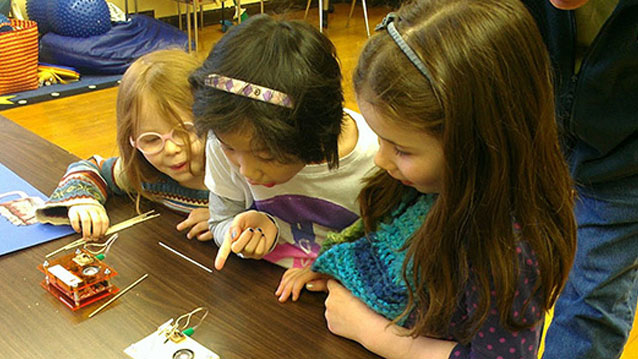EVANSTON, Ill. --- Brain power isn’t just for the classroom, hundreds of Chicago-area elementary school students soon will learn. Brain power can send a robot made of Legos zooming across the room, just by using the electrical signals your brain sends to your muscles to clench a fist.
Volunteers with the Northwestern University Brain Awareness Outreach organization will help students and their families experience this power and learn what makes the brain tick through hands-on demonstrations and experiments at the third annual “Brain Fair” to be held March 16 at The Nettelhorst School in Chicago’s Lakeview neighborhood.
The Brain Fair’s 17 activities are designed not only to teach but to engage and surprise.
The event is so hands-on that participants will have the opportunity to hold a real brain in their hands and compare the brains of different animals. And those students controlling a Lego robot with their muscle signals will learn how this mind-inanimate object interaction might be used in prosthetics. Participants also will look at slides of brains, experience optical illusions and even learn how to disrupt one’s balance with the flick of a switch.
Seven hundred elementary school students, parents and guardians from across Chicago are expected to attend the free program. The Brain Fair introduces students to many different aspects of the brain, from electrophysiology to cognitive science, while also exposing them to potential educational paths and careers.
“This is an opportunity to bring neuroscience experiences not only to hundreds of children but also to their parents,” said Jessica Wilson, a student in Northwestern’s Interdepartmental Neuroscience (NUIN) Ph.D. program and a co-organizer of the fair. “By inviting parents to attend with their children, we hope to spark science learning and conversations that extend far beyond the event and into the home.”
And the Brain Fair isn’t just popular with young students and their families. Since the first fair two years ago, the number of Northwestern volunteers -- graduate and undergraduate students, postdoctoral fellows, faculty and staff from both campuses -- has nearly tripled, from 25 to 70. This support has allowed the organizers this year to increase to 700 the number of students, parents and guardians who can attend. (Attendance the first year was 300.)
The Northwestern volunteers are split nearly evenly between the Chicago and Evanston campuses. They represent four schools -- the Feinberg School of Medicine, the Weinberg College of Art and Sciences, the McCormick School of Engineering and Applied Science, and the School of Communication -- and are from many programs, including NUIN, biomedical engineering, psychology, communication sciences and disorders, and cognitive science.
“We share experiments that we feel create astonishment and excitement in parents and kids alike, and embed learning within an unforgettable experience,” said Shoai Hattori, also a NUIN student and Brain Fair co-organizer. “The Brain Fair gives all of us a chance to bring the excitement out of the lab, to talk to people and get them excited about what we do. It's become a great bonding experience every year for us.”
The Brain Fair is held in celebration of Brain Awareness Week, a global campaign to increase public awareness of the benefits of brain research.
“My son couldn’t get enough of the Brain Fair -- I had never seen him so interested in science,” said a parent about last year’s event. “Because everything is hands-on, I feel that he really learned about how the brain works -- and now he wants to learn more.”
Following the success of the first two Brain Fairs, Hattori and Wilson founded the Northwestern University Brain Awareness Outreach (NUBAO) organization. Led by neuroscience graduate students, NUBAO is dedicated to bringing neuroscience to the public in the Chicagoland area. It hosts workshops, open houses and lectures during and outside of Brain Awareness Week.
The young organization already has made an impact. The Brain Fair was awarded “Best Outreach Event” by The Graduate School in 2012, and Hattori and Wilson subsequently were nominated for the “Next Generation Award” by the Chicago chapter of the Society for Neuroscience, for outstanding efforts in neuroscience education and outreach. NUBAO is funded by NUIN as well as a Community Building Grant from The Graduate School.
The Brain Fair will be hosted by The Nettelhorst School, 3252 N. Broadway St., Chicago. Two sessions will be held: one from 9 to 11:30 a.m. and the second from 1:30 to 4 p.m. Activities are geared to children in kindergarten through 8th grade.
Families can register on a first-come, first-served basis at www.nettelhorst.org. Children must be accompanied by a parent or guardian.


